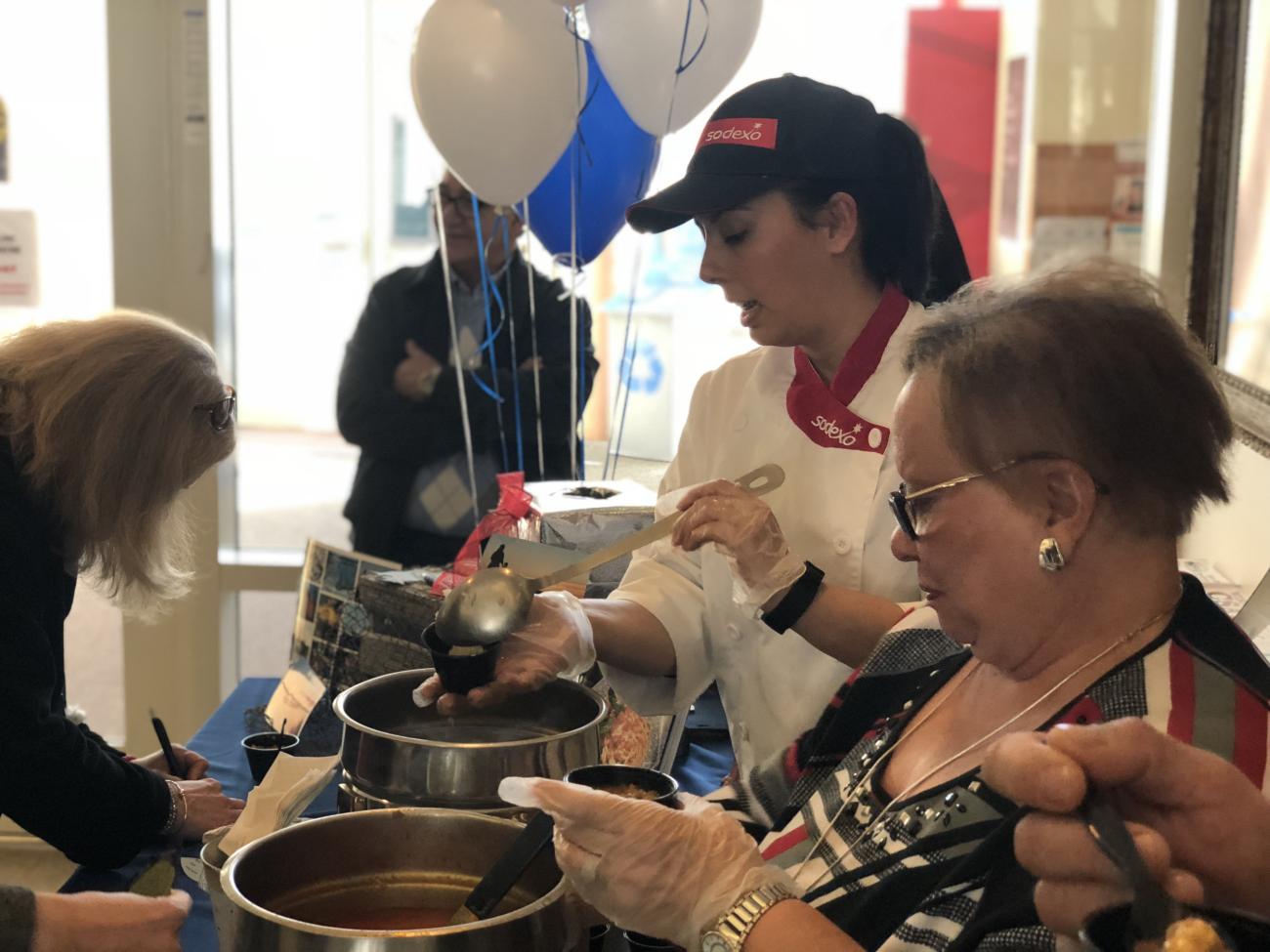Healthy Food in Health Care Ambassador, Cassandra Cracchiolo serves monkfish stew at an event to introduce and educate about local seafood, especially undervalued species. She was joined by Angela Sanfilippo from Massachusetts Fisherman’s Partnership (John Stoddard).
Cassandra Cracchiolo, McLean Hospital chef manager, loves seafood. She grew up around seafood, as her family is in the fishing industry in Gloucester. Cooking fresh locally caught seafood with her family is part of the reason she became a chef. Cracchiolo has also seen the struggles that fishing communities are facing, and decided to do something about it through her role as a Healthy Food in Health Care ambassador.
Launched in January 2016, the Healthy Food in Health Care ambassador program brings together a cohort of health care representatives from across New England to work independently, for one year, on food projects in their facilities.
Ambassadors receive support for their work from a Health Care Without Harm staff member, a health care “mentor” who is experienced in local and sustainable food initiatives, and their ambassador peers. Each year ambassadors begin the program with a training in the primary issue areas for the Healthy Food in Health Care program and are provided with additional professional development opportunities throughout the program year.
The first two years of the program, 2016 and 2017, resulted in 13 different projects throughout the region and involved 19 health care representatives through Ambassador or mentor roles.
Cracchiolo is one of six ambassadors that began in January 2018. For her project, she will work to increase McLean Hospital’s purchases of local seafood through Red’s Best and a community supported fishery program.
Our 2018 ambassadors hail from Maine, Vermont, New Hampshire and Massachusetts. They share a strong commitment to healthy and sustainable food and extensive experience in health care. Using their unique perspective and experience, they will carry out projects focused on increasing engagement in and institutional support in one of the following areas:
- Reducing the amount of meat served at their facility
- Increasing the amount of sustainably-raised meat served at their facility
- Increasing local food procurement at their facility
- Fostering cross-departmental connections related to healthy food access (community benefits, employee wellness, food services, etc.)
- Engaging the facility in a community food initiative.
Participants also pledge to share their projects through conference presentations, grand rounds, or organizing a meeting or webinar. Shelley Goraj from Maine General and Johanna Setta from Northwestern Medical Center, ambassadors from 2017, are serving as mentors to the 2018 class.
Meet the 2018 ambassadors
Less meat, better meat
Barb Haskell, Food Service Director, Blue Hill Memorial Hospital, Maine
Haskell will be working to increase her facility’s use of antibiotic-free and local meat, focusing on the most used products in the hospital. She will work to build the case for doing this to her system’s leadership by sharing her successes and formalizing Eastern Maine Healthcare System’s commitment to this work by signing the Healthy Food in Health Care Pledge. Haskell will address increasing costs of “better meat” by reducing meat in some dishes and creating new vegetarian and vegan dishes. She will share one of the new recipes with a national audience through the 2018 Healthy Care Culinary Contest.
Less meat, better fish
Cassandra Cracchiolo, Chef Manager, McLean Hospital, Mass.
Cracchiolo is working to reduce the amount of meat served in her cafeteria by substituting local seafood. She will audit the hospital’s menu to identify where they can replace a beef, pork, or poultry dish with a “catch of the day” item. She will also identify any non-local seafood species the hospital is using and aim to replace those items through an institutional scale community supported fishery program that sources seasonal seafood direct from fisherman.
Soup du jour
Danielle Pothier, RD, Wellness Specialist, Northwestern Medical Center, Vt.
Pothier will reduce the usage of meat at her facility by targeting soups. She will analyze the recipes for the current soup offerings and identify opportunities to reduce meat by substituting grains or vegetables and will replace some meat-based soups with vegetarian and vegan options. Pothier will promote the new soup offerings through tastings and creative naming and will share her progress with her facility’s interdepartmental food team.
Grow your own
Tom Wagstaff, Director of Dietary, High Point Treatment Center, Mass.
Wagstaff will increase High Point’s access to (very) local food for their kitchens while providing an educational and therapeutic activity for patients by implementing on-site gardens on their campuses. The gardens will grow herbs and produce — some of which will align with the seasonal items in the Nourished by New England program. Staff and patient volunteers will plant, maintain, and harvest the crops.
Buy local
Tiffany Sweatt, Nutrition Services Director, Upper Connecticut Valley Hospital, N.H.
Sweatt will work to support her area’s local farmers by increasing the hospital’s purchases of local produce and by starting an onsite farmer’s market. She will aim to increase purchases from one percent (the 2017 baseline) to five percent of their produce spending. Sweatt will utilize Health Care Without Harm resources such as the administrator’s brief and the Delivering community benefit: Healthy food playbook to obtain buy-in from her hospital’s leadership for local food initiatives and will explore local options from her distributor as well as direct from farms.
The business case for plant-based
Dan Roth, Project Analyst, Brigham Health, Mass.
Roth is drawing from his experience as a financial analyst to make an economic case for plant-based and reduced-meat diets. He will conduct research into how reducing meat is in a health care institution’s financial interests. He will present his findings at a meeting with the chief financial officer and produce a written document that outlines the case. Roth will work with the food service and finance departments and clinicians to inform his project and will celebrate his finished product by hosting a plant-based lunch at Faulkner hospital.
